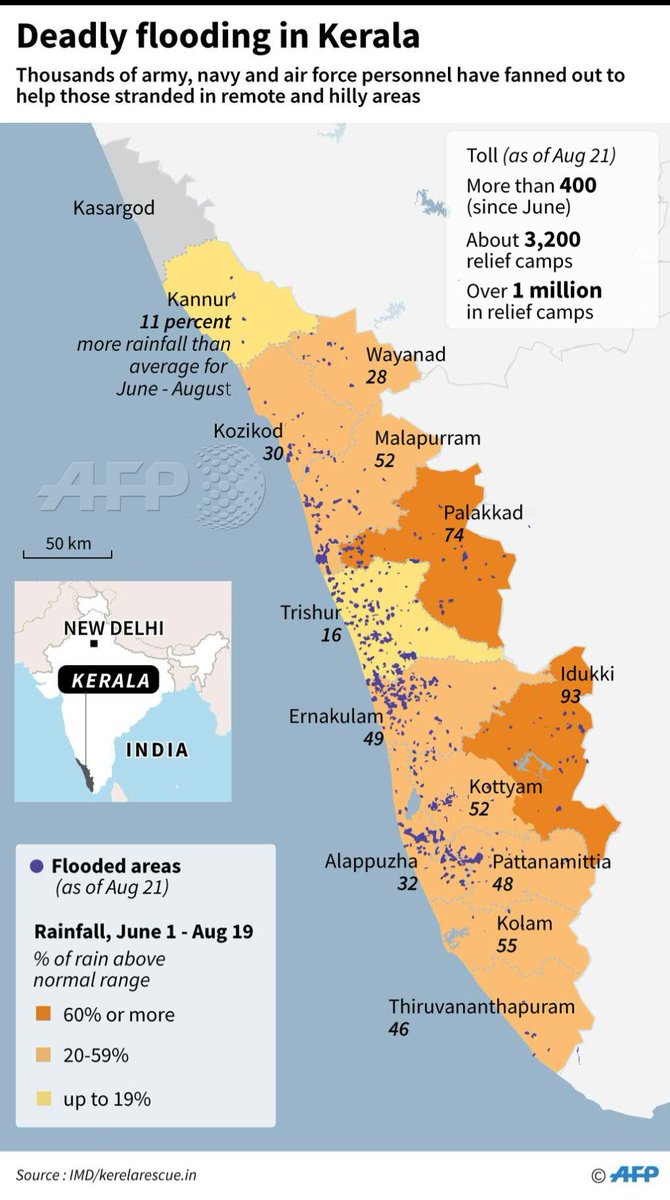Extreme events such as droughts, floods, heat waves, cold waves, devastating thunder clouds,
cloudbursts and intense cyclonic storms have been occurring frequently over the globe in
recent decades. Climate change is realized all over the world and is significantly altering
the structure and functioning of many ecosystems. Significant advances in the scientific
understanding of climate change now make it clear that there has been a change in climate
that goes beyond the range of natural variability.
An example of how devastating climate change can be is the floods in Kerala for the past three years.
Kerala is a state of India located towards the south. It is geographically bordered by the Western Ghats
which is a chain of mountains that contribute to its hot and humid climate. 
The first floods happened in 2018,an unexpected disaster for which nobody was prepared for. Monsoon, as the rainy season is called, usually takes place in the months of June, July and august. It was unusual feat of how Kerala received more rain than it ever received, exactly 42% more!!!. In three months, Kerala received almost all the rain that it receives
in a year. Kerala has a lot of backwaters and rivers which receives its water from the dams. The monsoon rain resulted
in rapid filling up of dams and overflowing river shores thereby flooding whole cities, disrupting social life.

The season ended up racking 483 deaths and many injured both physically and mentally from the lose of homes and
loved ones. Almost one million people were displaced. This happened again in 2019 with the same magnitude
but resulted in less casualties and also once more in 2020, during the pandemic. But didn't cause too many casualties
because of warnings from the IMD (Indian Meteorology Department).




Several climate experts had predicted that floods would recur in a five-year interval instead of the historical 100 years.
But in Kerala, it is occurring for the third consecutive year. A study, later conducted on the repetitive flooding, revealed
the role of climate change. In this study, they used high-resolution WRF(Weather Research and Forecasting) and the WRF-Hydro simulations to explore the major factors behind the Kerala floods of August 2018. They also simulated the floods under pre-industrial and RCP8.5 background states to determine the effects of past and future climate change. The results
lead to increasing global warming causing deep depressions to form rapidly over the sea and due to the monsoon season
lining up with this anomaly increased the precipitation rate by 50% and thereby the floods. They also brought a future study
of how much devastating these floods can be. According to the study, if they were to happen again in a future climate
(RCP8.5) scenario at the end of this century, the effect of increased tropical humidity would far outweigh the
weakened depressions, likely resulting in a significantly more catastrophic scenario.
We look forward to your comments.
Thank You
-Team Maya Ma'am, Devanarayan, Ananya Reji, Vamika Giridhar, Johanna Christy.
Links to all the images in this post.
Image 1-https://www.thesun.co.uk/wp-content/uploads/2018/08/DD-COMPOSITE-KERELA.jpg
Image 2-https://pbs.twimg.com/media/DlHCiQ2XsAEVynR.jpg
Image 3-https://static.india.com/wp-content/uploads/2017/04/Monsoon.jpg
Image 4-https://kj1bcdn.b-cdn.net/media/22791/kerala-flood.png
Image 5-https://www.dailyhawker.com/wp-content/uploads/2018/08/Monsoon-Flood-in-Kerala.jpg
Image 6-https://static.theprint.in/wp-content/uploads/2018/08/2018_8img18_Aug_2018_PTI8_18_2018_000150B-e1534663058424.jpg